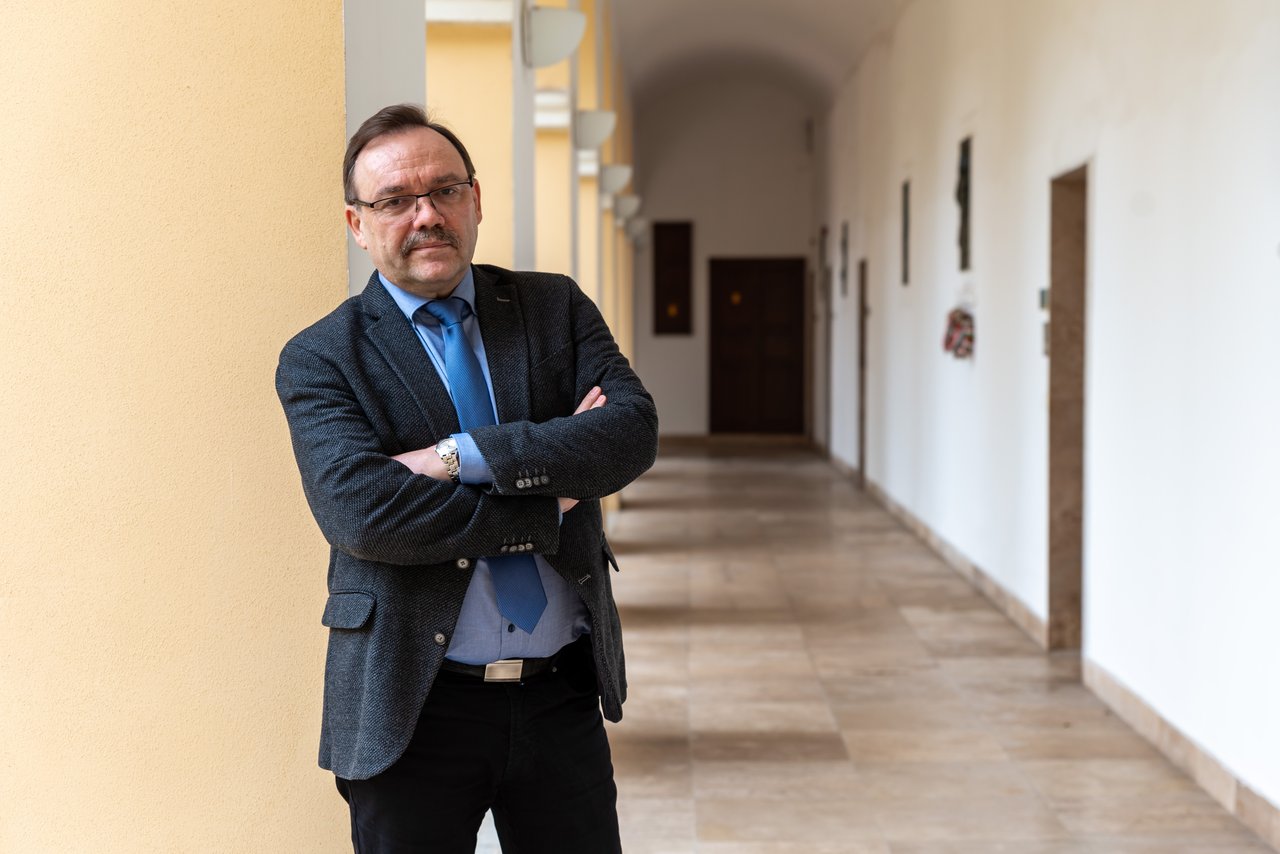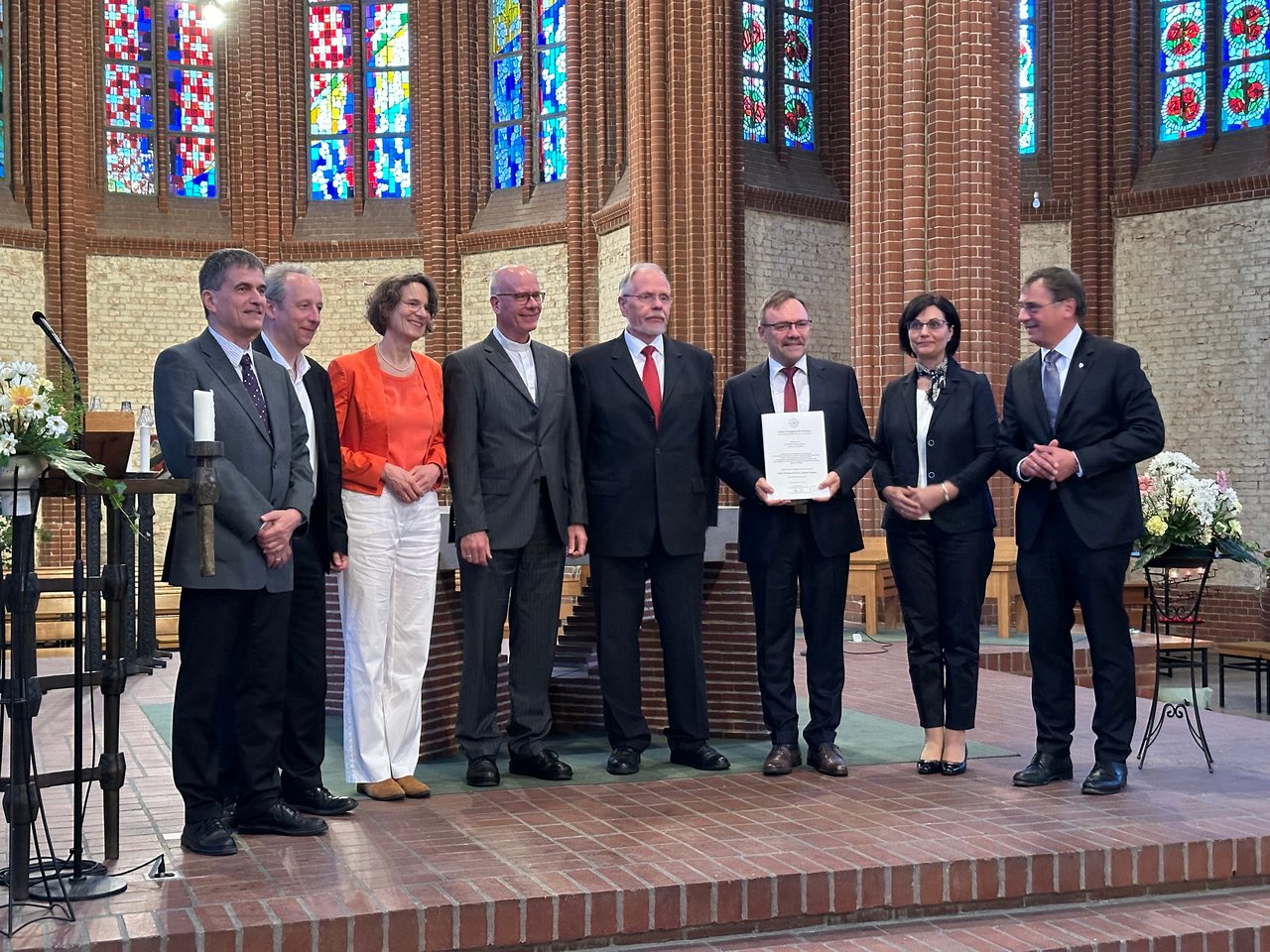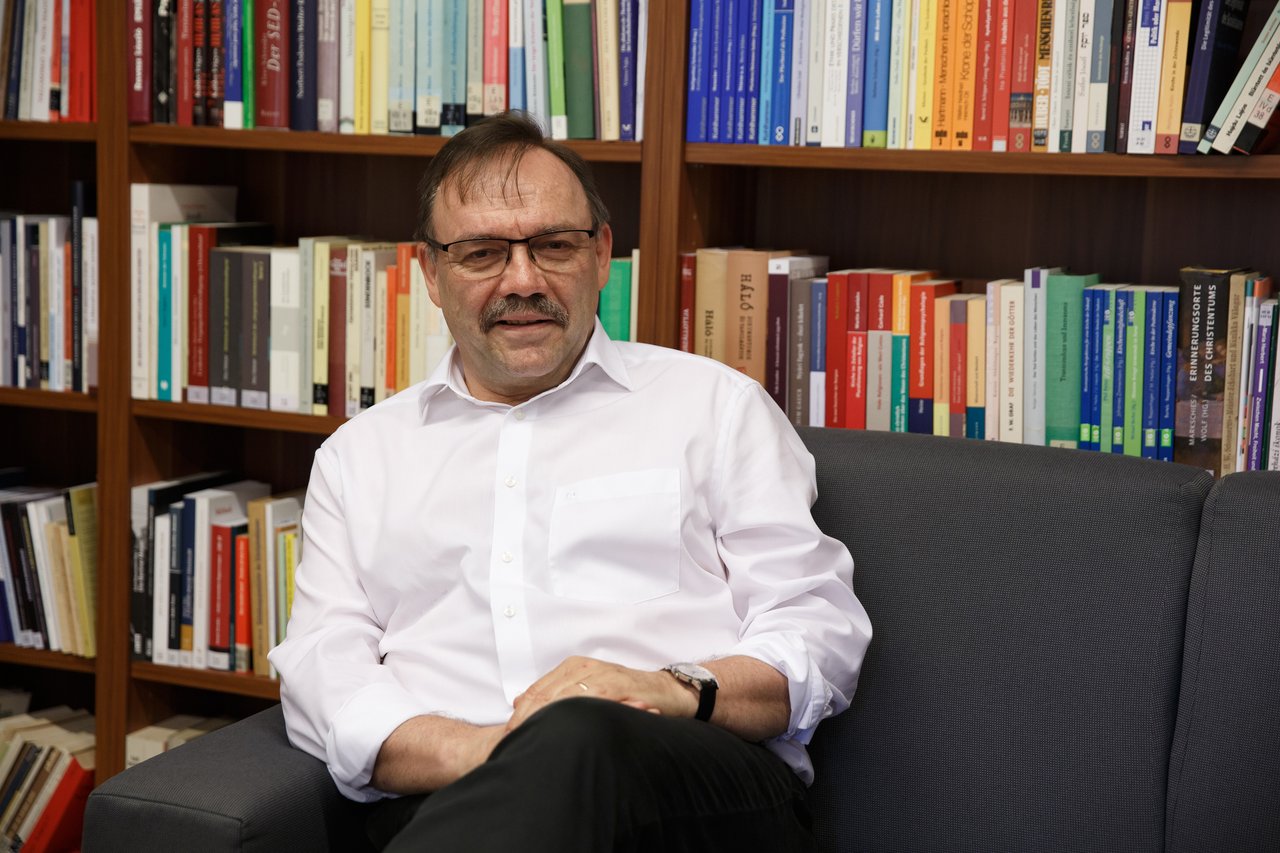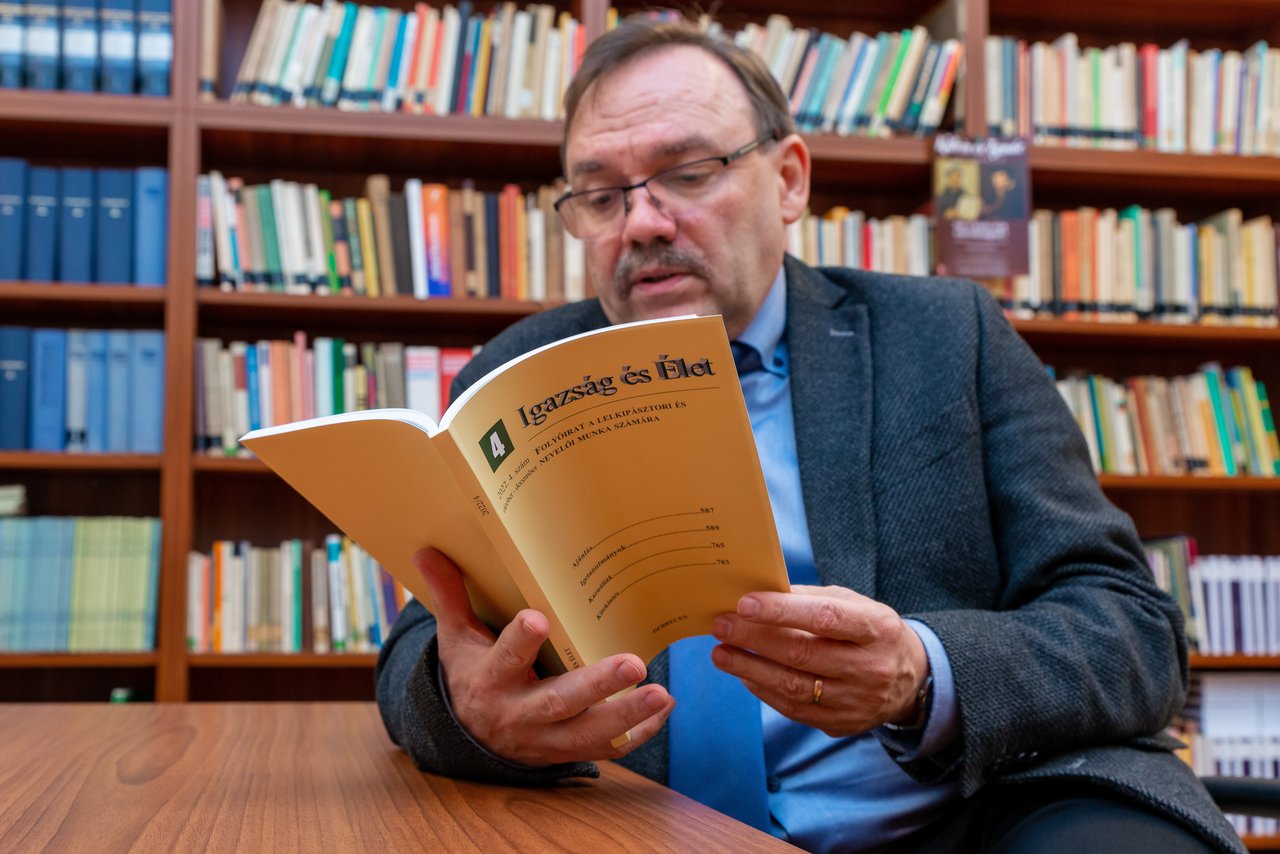“Karl Barth's lasting merit is that he firmly warned against any attempt to turn theology into a system of worldviews,” says theologian Sándor Fazakas, head of the Department of Social Ethics and Church Sociology at the Debrecen Reformed Theological University. This year, he was awarded the prestigious Karl Barth Prize, founded in 1986, by the German Union of Protestant Churches (UEK), and we asked him for an interview on this occasion.

Sándor Fazakas
Photo: Attila Zelenka
Why did you - a Hungarian theologian - receive this award this time?
The jury's rationale was that I have consistently sought to bring the transformative power of Barthian theology to bear in my own work, to act as a bridge between Central and Eastern European and Western European Protestantism, and to demonstrate a commitment to reconciliation. It is a great honour for me, a Hungarian Reformed theologian, to have been awarded this prize, since, so far, only scholars from the American-English and German-Swiss language areas have been honoured with this - truly prestigious - award. So it is not only me who enjoys doing theology, others also appreciate what I have done. Of course, this also means a task, because I must continue to maintain a dialogue with those who have had the opportunity to learn about and follow my work in German and English in international journals, conferences and academic panels. It is noteworthy that the awarding body, the German Union of Protestant Churches, which includes several Protestant church heritages - above all Evangelical, Reformed and United, or 'unionised' - has shown openness in awarding me the prize. They were genuinely curious to know what a theologian from Central and Eastern Europe, from Hungary, could tell them, German Protestants, about the timeliness of Barth. This might make us Hungarians wonder, on the basis of the principle of reciprocity: would it be true that the Western Protestant churches have nothing to say to us?
Those, who do not believe that it is worth keeping a watchful eye on the Western churches, are not condemning the progressive theologies that are advancing in many directions?
When I read one-sided press reports that make it seem as if the mainline Protestant churches in Western Europe, and even overseas, are uniformly liberal or declining, it is hard not to get annoyed. The blatantly one-sided judgments that occur within our churches reveal not objectivity but identity politics: a desire to define ourselves against something, to raise our value higher and higher by smearing the Western churches. But just as in our Reformed Church, so in our German or Swiss or Scottish sister churches, there are many different theological traditions and theological heritages, and they are engaged in a fair and respectful dialogue with each other. This alone is worth learning from them. Mutual openness is a treasure which is biblical, Protestant, evangelical and, for the future of the Church, can be fruitful.

Awards ceremony on 8 June in Frankfurt an der Oder (Germany)
Photo: reformatus.hu
What is the significance of the emergence of neo-orthodoxy in the work of Karl Barth? Is it an exaggeration to say that in doing so, he prevented the further advance of liberal theologies?
The essence of Barthian theology is that God's revelation must and can be known from the Word, and not from the world or history as it is, nor from one's subjective religious experiences or other religious substitutes or from other systems of ideas that seem very religious or Christian. One comes to this knowledge by faith, that is, by the illuminating power of the Holy Spirit. Or, in other words, we can respond to God's call to us in prayer and by living a faithful Christian life. This is good for us, Hungarian Reformed Christians to hear. But perhaps Barth was called neo-orthodox because he identified the Word, God's self-revelation, as the sole source of knowledge of God. However, Barth himself considered this categorisation, that is, that he was orthodox or neo-orthodox, to be ridiculous. In an interview at the end of his life - published in Hungarian by the Barth Institute in Debrecen - he said: 'When I hear that word, I can only laugh.' In contrast, to the interviewer's great surprise, he called himself a liberal. And he explains why: liberal Barth says that being liberal means being accountable and open-minded... A truly free person - one who knows no absolute authority other than God - takes responsibility for what he says and does, and is open: to the traditions of the past, to the possibilities of the present and to what lies ahead.
Barth's ideological critique of Hitlerism, which he excelled in, is usually praised. But at home, one also hears voices suggesting that he offered the Reformed Church in Hungary a compromise when the communist regime was being established.
This is a simplification! The use of Barth's teaching in the Hungarian church was typically tendentious from the post-war period until the change of regime. First of all, let us be clear: at that time, the church was living in a social formation that sought to displace and eliminate the Christian churches. Self-critically, we must see and admit that there were not only sufferers of the communist regime in the church but also a profiteering layer that tried to see the new socialist system as meeting with God's good pleasure. On this basis, they urged the church to join in 'building socialism.’ It was customary in their circles to refer to Barth. The kernel of truth of their reference was simply that in 1948, the year of the communist turnaround, Barth visited Hungary at the invitation of the then Bishop László Ravasz. The people here were curious to hear the opinion of the internationally renowned Swiss theologian. He took stock of the situation in the country and the Reformed Church in Hungary, and of the regime that was being established here. He saw that the situation was causing great difficulties for the church, that it could not continue its social role where it had been interrupted by the war, and that it could not expect to be a valued strategic partner of the government. The distinguished guest from the West said that we must consider how our Church can survive and serve in a new environment which is more hostile than indifferent to Christianity. For, as he said in his Budapest lecture on The Christian Church in a changing polity, we must live and serve as a church in the new polity: we must look first and foremost to the great change that took place on the cross of Calvary. Even when the Church is completely up against the wall, the Gospel must be preached.
Could these thoughts have been interpreted as advising collaboration to Hungarian Calvinists?
On this lecture, his visit, and his letter to his Hungarian Reformed friends after his visit in 1948 - but also on other misinterpreted statements - they based their claim that "Károly Barth" would have welcomed the existence of the Church in the socialist state system and would have recommended that the Church accept the role assigned to it by the state. On the contrary, Barth was clear: just as one must not withdraw, or switch to a ghettoised way of being, one must not adapt unprincipledly - in other words, one must find a middle way between the two. And the proof that he really meant it is his letter of 1951 to Albert Bereczky, the successor of László Ravasz, after he had been forced to leave the episcopate. In this letter - which, of course, only became known after the regime change - Barth strongly criticized the Hungarian church policy decisions of the time, the excessive alignment of the Reformed leaders to the communist-socialist system...
...which adjustment also included the proclamation of the deification of the proletarian dictatorship as a historical development, by peace priests?
That's right. And it was precisely those theologians in this country - not incidentally as students of Barth or as understanders of Barthian theology - who perceived this ecclesiastical distortion, who represented the other, more authentic Barthian reception. This narrow circle of the latter theologians understood Barth's thinking in this way: to take it further and to think about its potential for ideological critique, the lessons of Barth's relevant theological insights, which warn that the state can indeed easily become distorted. The authoritarian, even totally distorted state, whether left or right, seeks to replace God. The proof of this is that it wants to make both the Christian individuals and the Church dependent. Barth's lasting merit is that he strongly warned against any theological attempt to turn theology into a worldview. He was also opposed to the theological attempts to justify and validate the church's role as a partner of the socialist state. This critical approach was represented in his footsteps by the theologians István Török and Ervin Vályi Nagy, but their writings were not very much in evidence in the official ecclesiastical press of the past regime.
How relevant in the world of liberal or even illiberal democracies are Barth's ideas on social development, after his death in 1968?
Reflecting on them is still a duty today, since he pointed out with a keen eye, especially in the last, fragmentary works of his oeuvre, that there are forces in the world that should create the conditions for human life, but instead can become rampant, demonic, claiming divine status. These can be, for example, the power, magic or self-righteousness of economics, politics, fashion, communication or information. These endowments were originally intended to help create the conditions for human coexistence. But if they become ends in themselves, if they become absolutised, it is the task of the churches and theologians to demystify these powers, which are almost beyond control. In a world in which any of these powers would seek to impose themselves exclusively, manipulate and oppress the individual, absorb the rest of life, and keep the order of human coexistence and religious organisations dependent, it is necessary to point out their idolatry. Jesus taught that tribute was due to Caesar, but not divine worship. Western civilisation is built in no small part on this distinction of Jesus', and so we must check from time to time whether there is anything that might be an obstacle to the application of this principle.

Photo: Attila Zelenka
We have to find our own voice, and our own message in the evaluation of given social situations and phenomena.
Leaving aside the question of total states, what often happens is not simply that the church and a political formation overlap on an ethical issue, for example: same-sex marriage with adoption, active euthanasia? Is it the church's fault that a party - obviously also for the sake of daily politics and vote maximisation, supported by opinion polls - takes up such flesh-and-blood issues?
Of course, it is not wrong, and indeed appropriate, for a society's values to be at least partly in line with the Christian values and ethical consistency of the church within which it operates. Let us point out: it may be that the values and opinions of a society are due precisely to the fact that the churches have been effective for a long time, even for centuries, in their action through education and culture, i.e. they have interacted well. However, it is not at the level of political slogans that values must be championed, but through systematic work.
What do you mean?
It is the experience of all time that politics - all politics, whether right or left, conservative or liberal, pro-government or opposition - seeks to create loyalty, to shape identity, to shape public discourse in the interests of power. Unfortunately, the Church is at best a mere 'follower' of these events, making no attempt to take the initiative in the social debate on an issue in which it should have a say since it is in the world. All it does is join in the rhetoric of dissociation, for example, or to close itself off and say nothing. We follow events, we do not thematise public discourse. However, for the Church to speak out competently, more time, energy, experts and other conditions would be needed to develop a position that the Church can take, for example on gender ideology or end-of-life ethical decisions.
Isn't this the maturation that makes the time go by? So many times the Scriptures are so clear in their answers to bioethical questions about the order of creation!
Our lives are becoming more and more complicated, and no church leader can be expected to be competent, professional and prepared to speak out on every issue - be it economic or social policy, bioethics or sexual ethics. Unfortunately, however, the conditions for supporting them are not being met. We do not have back-up institutions or even permanent professional panels, set up at least in good time, to provide analytical background work in preparation for official statements on specific issues. If all we have is rhetorical speeches, or if we take on the panels of political forces, with a little Christian veneer, and try to make them our own, no one will take us seriously. It is obviously a certificate of poverty when we accept external claims to legitimacy: when we uncritically assume the social role assigned to us, when we are successfully expected by either liberal or conservative political forces to join the mainstream they represent. This can happen everywhere, in Western Europe and in Central and Eastern Europe. If we do this uncritically, if we give in to such covert or overt offers, we remain a 'defective church,’ to quote Barth. We have to find our own voice, and our own message in the evaluation of given social situations and phenomena. Moreover, the community of Christ must also listen to those who are the victims of certain political and economic decisions or promises and who feel excluded. For them, too, we have a missionary and diaconal responsibility, for them, too, we must obey the commandment of Jesus' love, and the doors of the church must be open to them too.
SÁNDOR FAZAKAS, theologian, and university professor, was born in 1965 in Tîrgu-Mureş/Marosvásárhely (Romania). He began his theological studies in Cluj-Napoca in 1985 at the Reformed Faculty of the Protestant Theological Institute, continued at the German- speaking Saxon Evangelical Faculty of Sibiu/Hermannstadt (Romania), and completed his studies at the Debrecen Reformed Theological University (Hungary). As a scholarship holder, he studied systematic theology, social theology and practical theology at the Theological Faculty of the University of Münster/Germany (Westfälische-Wilhelms Universität). He was a pastor in Milota from 1992 and in Hosszúpályi from 1995-2018. Since 1995 he has been a lecturer at the Kölcsey Ferenc Reformed Teacher Training College, and since 1996 he has been teaching at the Department of Social Ethics and Church Sociology at the Debrecen Reformed Theological University. He is the head of the Karl Barth Research Institute in Hungary.

Photo: Attila Zelenka